Blog

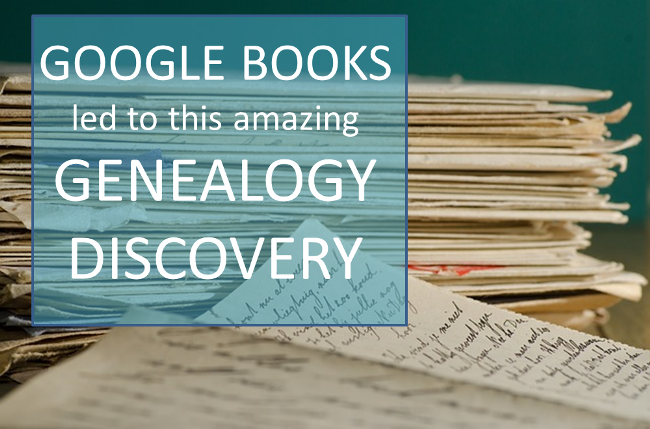
“I Found 130 Letters by My Ancestor!” Why Use Google Books for Genealogy
Betty has at least 130 good reasons to use Google Books for genealogy! She used this powerful Google tool to find her ancestor’s name in a book–which led to a treasure trove of his original letters in an archive. Here’s what happened–and how to try this with your own family history research.

You’ve heard me say that Google Books is the tool I turn to every day. Now, you may be thinking, “But my ancestors wouldn’t be in history books!” Resist the temptation to make assumptions about sources, and about your ancestors. With over 25 million books, Google Books is more likely to have something pertinent to your genealogy research than you think. And as I often tell my audiences, those books can include source citations, providing a trail to even more treasures.
Why to Use Google Books for Genealogy: Success Story!
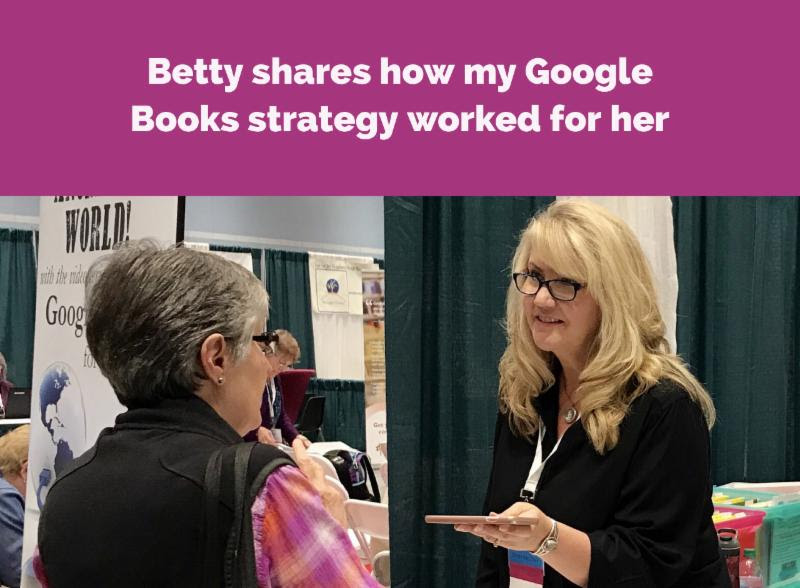
At the National Genealogical Society conference this past spring, Betty attended my class and then stopped by the Genealogy Gems booth to share her story. I recorded it, and here’s a transcription:
Betty: I was stuck on my Duncan Mackenzie ancestor, so I put his name in Google Books, because when you’re stuck, that’s what you do!
Lisa: Yes, I do!
Betty: So, up popped this history of Mississippi, it was sort of a specific history, and it said Duncan Mackenzie had written a letter to his brother-in-law in North Carolina from Covington County, Mississippi. And of course I already had my tax records and my census records that placed him in Covington County. This was in the 1840s. I thought, this just couldn’t be him! Why would any of my relatives be in a book? [Sound familiar?]
So, finally, weeks later, it occurred to me to go back and look at the footnotes in the book, and I found that the letters could be found in the Duncan McLarin papers at Duke University. So, I didn’t even think to even borrow the microfilm. I just told my husband, “next time you go East for work, we need to go by Duke University.” So I set up a time, and I went, and it WAS my great-great-grandfather who wrote those letters! I have now transcribed 130 letters from that collection. They let me scan them all, and I’ve been back again to scan the rest of the legal papers.
Lisa: So, an online search into Google Books not only help you find something online, but it led you to the offline gems!
Betty: And it just changed my life! Because I spend all my time on these letters. It’s distracted me from other lines! [LOL! I get that!]
How to Use Google Books for Genealogy
Are you ready to put Google Books to work in your own research and discover some genealogy gems of your own? Here, I re-create Betty’s search for you, so you can see how to get started:
1. Go to Google Books (books.google.com). Enter search terms that would pertain to your ancestor, like a name and a place.

2. Browse the search results. The first three that show up here all look promising. Click on the first one.
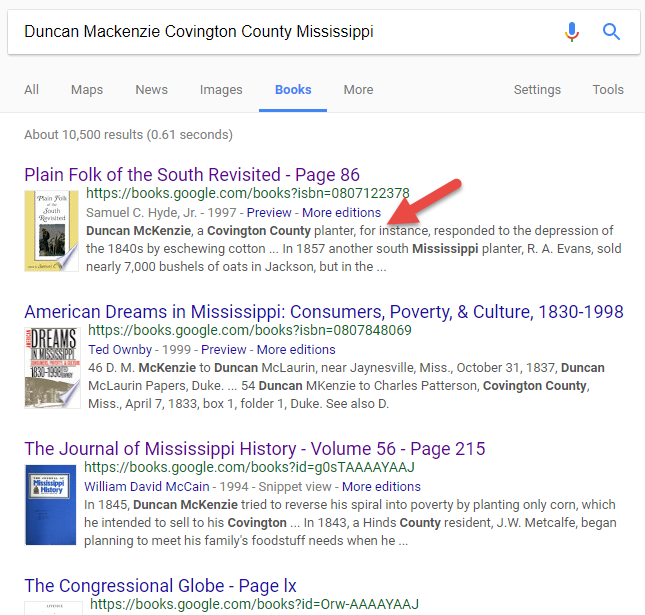
3. Review the text that comes up in the text screen. As you can see here, Duncan McKenzie of Covington County is mentioned–and the source note at the bottom of the page tells you that the original letter cited in the book is at Duke University.
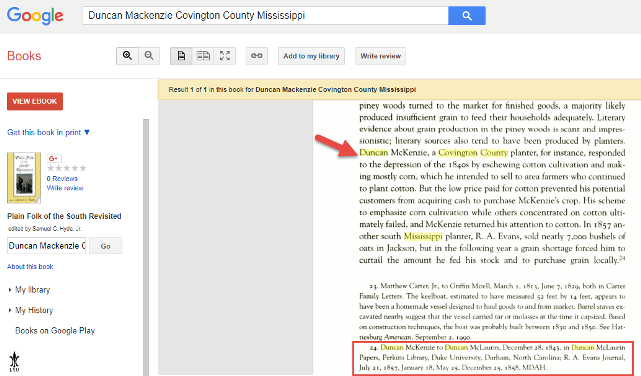
Learn More about Using Google Books for Genealogy
Learn more by watching my free Google Books video series at the Genealogy Gems YouTube Channel. Click the video below to watch the first one. (And be sure to subscribe while you’re there, because there are more videos to come!)
Then, watch the video below for a quick preview of my full one hour video class (and downloadable handout) called Google Books: The Tool You Need Every Day!, available to all Genealogy Gems Premium Members.
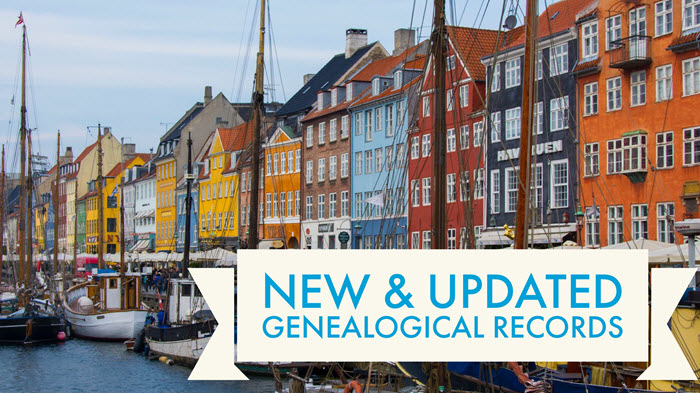
Denmark Census Records: This Week in New & Updated Genealogy Records
Denmark Census Records are new at FamilySearch this week. Other new and updated genealogy records include new vital records for England, Catholic Parish records for Scotland, and various unique collections like WWII records for New Zealand, French Polynesian vital records, and military records and more for the United States.

Denmark Census Records
FamilySearch.org now has Denmark Census collections for the following years: 1860, 1870, 1880, 1890, 1901, & 1906. These indexes (provided by MyHeritage) are totally free to explore at FamilySearch, and the images were provided previously from the National Archives of Denmark.
England Wills & Probate
New at Findmypast is an index of over 229,000 Lancashire Wills & Probate 1457-1858 records. This index of more than 229,000 records will give you details about the type of material available, the probate year, and your ancestor’s occupation and residence.
Also new from Findmypast this week are large records for Herefordshire. You can search indexes for Baptisms starting in the early 1500s, Marriages 1538-1936, Burials spanning four centuries, and Wills 1517-1700.
Scotland: Catholic Parish Records
An extensive collection of browsable Scottish Roman Catholic Parish records is now available at Findmypast. It consists of all eight Scottish dioceses: Aberdeen, Argyll & The Isles, Dunkeld, Galloway, Glasgow, Motherwell, St Andrews & Edinburgh, and Paisley. Records begin as early as 1736 and continue until 1942.
New Zealand WWII Records
The Auckland War Memorial Museum has made over 100,000 WWII records available free online. From a recent press release: “Of the 140,000 New Zealanders dispatched to serve overseas in WWII, 104,000 of them served with the 2NZEF. Auckland Museum is now making these WWII Army personnel records publicly accessible through Online Cenotaph.”
French Polynesia: Vital Records
New this week at FamilySearch: Civil registration of births, marriages, and deaths for French Polynesia, 1843-1999. Original records are located with the Tribunal Civil, Papeete, Tahiti.
United States Military Collections & More
Japanese internment camps. Now available at FamilySearch.org: War Relocation Authority Centers, Final Accountability Rosters, 1942-1946. From the collection description: “Digital images of originals are held by the National Archives at College Park, Maryland. These rosters are alphabetical lists of evacuees housed in relocation centers from 1945-1946. This project was completed in cooperation with Densho: The Japanese American Legacy Project.”
Audio recordings. Check out The Great 78 Project! You can listen to this collection of 78rpm records and cylinder recordings released in the early 20th century. These recordings were contributed to Internet Archive by users through the Open Source Audio collection. The Internet Archive has digitized many.
Montana. A new Birth Index 1870-1986 is available at Ancestry.com. The Death Index 1907-2015 has also been updated. These records come from the State of Montana Department of Public Health and Human Services. Copies of the actual certificates may be ordered from the Office of Vital Statistics.
Virginia. Also new at Ancestry.com are Virginia Vital Records, 1660-1923. Indexed information may include primary names and names of family members, as well as birth, marriage, death, and burial information. This collection was indexed by Ancestry World Archives Project contributors.
North Carolina. From the State Archives of North Carolina: New Veterans Oral History Collection Online. “The interviews, conducted since 2015 as audio interviews, are part of the Military Collection’s North Carolina Veterans Oral History Program, whose goal is to capture and provide access to the memories and experiences of the military servicemen and servicewomen from North Carolina, preserving them for the future scholarship.”

Be sure to share this post with your genealogy friends and groups so they can explore these wonderful new collections!
Disclosure: This post contains affiliate links and Genealogy Gems will be compensated if you make a purchase after clicking on these links (at no additional cost to you). Thank you for supporting Genealogy Gems!
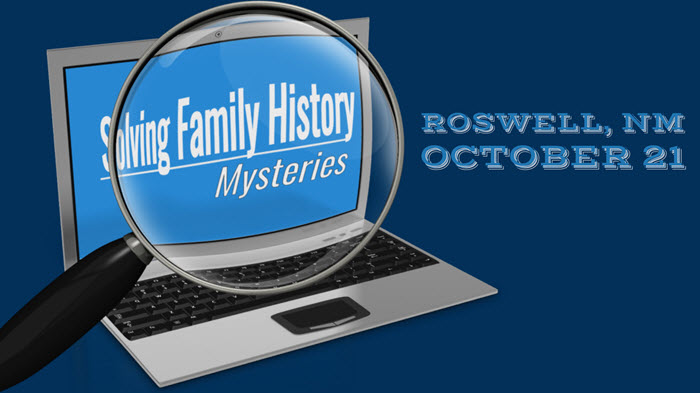
Solving Family History Mysteries in Roswell, NM: Genealogy Seminar with Lisa Louise Cooke
You’re invited to join Lisa Louise Cooke for a Roswell, NM genealogy seminar. “Solving Family History Mysteries with Lisa Louise Cooke” will be held on Saturday, October 21, 2017 as the Wilson-Cobb History and Genealogy Library Annual Workshop. Please come!

Roswell, NM Genealogy Seminar with Lisa Louise Cooke
The Wilson-Cobb Library in Roswell, New Mexico is hosting Lisa Louise Cooke for an exciting, informative all-day workshop that will help you solve your family history mysteries! Here’s what’s happening:
What: Solving Family History Mysteries with Lisa Louise Cooke
Where: Roswell Civic and Convention Center, 912 N Main St, Roswell, NM 88201
When: Saturday, October 21, 2017, 9:00 am – 4:00 pm (On-site registration opens at 8:30 am)
Hosted by: Wilson-Cobb History and Genealogy Library
Registration: Click here for more information and to register
Bonus: Snacks, beverages and a catered lunch will be served. (Donations gratefully accepted for lunch.)
If you haven’t registered ahead of time, plan to be there at 8:30 am for onsite registration. At 9:00, Lisa will start teaching the day’s class lineup:
Google Tools & Procedures for Solving Family History Mysteries. In this session, we will walk through the process, provide you with the tools, and wow your socks off with real-life examples of Googling success. You will leave this class inspired to revisit using Google for your online searches, and armed with the latest strategies to do so successfully. Not everything is online by any stretch, but even offline sources are more efficiently discovered and accessed when you start online. And the fastest and most effective way to locate online data, whether it resides on a university website or the blog of a distant cousin you’ve never met, is Google!
Update: Google! Everything New That You Need to Know for Genealogy. Google continues to evolve and change every day. In this session, Google Guru Lisa Louise Cooke will give you an update on the most recent Google changes. Then she will unleash advanced search strategies for genealogy that you probably aren’t using, but are ‘must-haves’ in order to get the best results possible. Here are tips and tricks you can put into practice right away.
How to Reopen and Work a Genealogical Cold Case. Become a genealogical detective in this vital session. You’ll learn to track ancestors like a criminal cold case detective, sniffing out holes in your research and getting missing information on the record with cutting edge technology.
Google Search Strategies for Common Surnames. Discover tips and tricks to find your ancestors with common surnames and surnames that double as common words in the English language with Google. Learn how to weed out irrelevant search results to save time and get to what you want faster. Then save and automate your searches to run for you! You’ll not only improve your searches, but also improve the chances that the information you post online will be found by other genealogists facilitating collaboration!
Don’t miss Lisa’s Google tips!
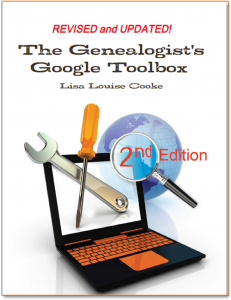 Solve more family history mysteries with Lisa Louise Cooke’s top-selling book, The Genealogist’s Google Toolbox (2nd edition). This “Google bible” for the genealogist tells you everything you need to know to master Google’s many powerful tools. Step-by-step instructions, clear illustrations and inspiring examples will teach you how to get the most out of Google searching (even for common surnames), Google Earth, Google Books, Google Scholar, Google Alerts, Google Translate and even YouTube.
Solve more family history mysteries with Lisa Louise Cooke’s top-selling book, The Genealogist’s Google Toolbox (2nd edition). This “Google bible” for the genealogist tells you everything you need to know to master Google’s many powerful tools. Step-by-step instructions, clear illustrations and inspiring examples will teach you how to get the most out of Google searching (even for common surnames), Google Earth, Google Books, Google Scholar, Google Alerts, Google Translate and even YouTube.
Read these Google genealogy success stories:
An ancestor’s pen name identified–and 69 of his articles found–with Google Books
Two ancestors’ homes found on the National Historic Register with Google Searching
The Colored Farmers Alliance: Social history revealed with Google and Google Books




